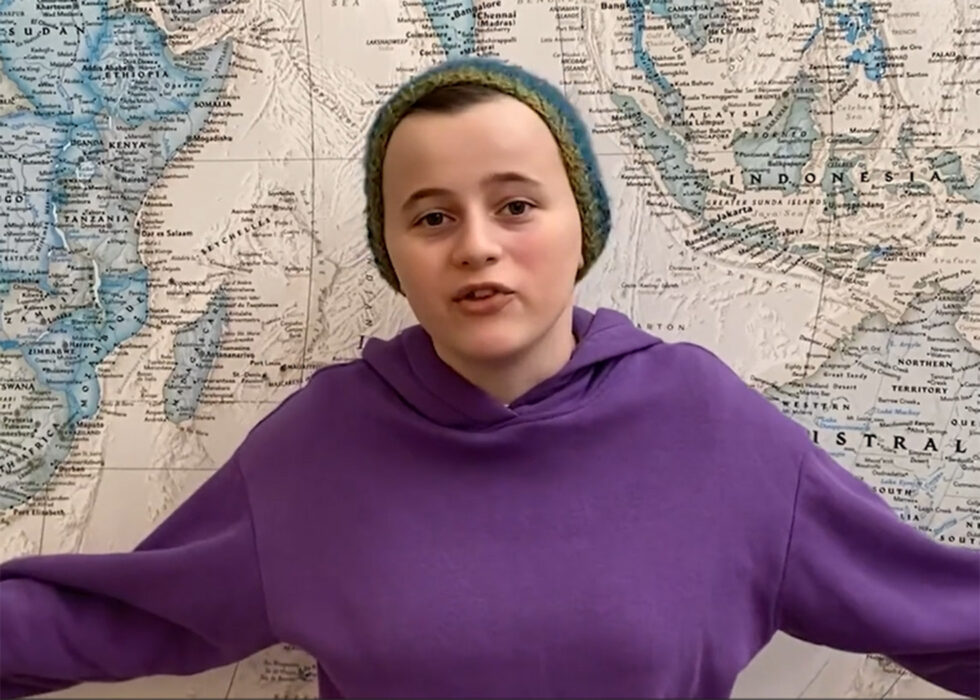From a grain of sand to stars in the nighttime sky, the world is full of awe. ISV’s Diane Bourke draws inspiration from the likes of Taylor Swift and William Blake to guide students writing to the theme of this year’s Student Poetry Competition.
ISV’s Student Poetry Competition is back for 2024 and this year’s theme is ‘Awe’.
Participants will often rely on various forms of assistance from teachers, parents and grandparents, who together form a critical element in producing the student’s final poem. These brief notes are designed to provide general assistance but, naturally, individual perspectives will always be of value. Poems can be submitted in either the written or performance form.

One useful explanation is that awe is what we feel when we encounter something vast, wondrous or beyond our ordinary frame of reference, something that challenges our understanding of the world. It may evoke a sense of mystery and wonder, such as the feeling associated with watching the sun rise over Uluru. But awe can also be found in the everyday, seeing a stranger give food to a homeless person or watching a spider weave a delicate web. Awe can also be elicited by music, art, or architecture, the supernatural, or a religious experience.
Psychologist Dacher Keltner from the University of California says that awe has many amazing benefits. It can make us curious rather than judgemental. It can make us collaborative, humble, sharing and altruistic. It quietens the ego so that we are not merely thinking of ourselves. Awe is a fundamental part of being human, making our bodies and minds more receptive to new information, new experiences and life’s deeper meaning.
When people feel awe, they sometimes express this in terms of ‘wonder’ and ‘curiosity’ – words that relate to our experiences of the world, but differ in their emotional tones and underlying motivations. Put simply, awe involves a sense of reverence or fear in response to something grand or incomprehensible; wonder involves amazement, admiration and fascination with the beauty or mystery of the world; and curiosity involves a drive to explore, learn and understand.
Awe is an integral part of many popular nursery rhymes such as:
Twinkle Twinkle Little Star,
How I wonder what you are.
Up above the world so high,
Like a diamond in the sky.
Or the opening lines of ‘Oh What a Beautiful Morning’, from the musical Oklahoma, captures the feeling of awe and appreciation for the wonders of the world, making it a suitable choice for expressing awe to children.
Oh, what a beautiful morning.
Oh, what a beautiful day.
I’ve got a wonderful feeling.
Everything’s going my way.
Many Australians know the lines from Dorothea Mackellar’s classic poem ‘My Country’:
I love a sunburnt country,
A land of sweeping planes.
It is a poem full of awe and admiration for the Australian landscape. Mackellar paints vivid images of the Australian environment and expresses her deep love and connection to the land, its beauty and vastness.
Mary Oliver also wrote poems that evoke a sense of awe and gratitude, but this time for the simpler miracles of nature. Her poem ‘The Summer Day’ exemplifies her exploration of awe-inspiring moments in everyday life. She helps us rethink what a simple, productive day might look like as she gets to know a grasshopper.
Who made the grasshopper?
This grasshopper, I mean
the one who has flung herself out of the grass,
the one who is eating sugar out of my hand
who is moving her jaws back and
forth instead of up and down-
who is gazing around with her
enormous and complicated eyes.
Many years earlier, around 1803, William Blake wrote a poem called ‘Auguries of Innocence’. It begins:
To see a World in a Grain of Sand
And a Heaven in a Wild Flower,
Hold Infinity in the palm of your hand
And Eternity in an hour.
The phrase ‘to see a world in a grain of sand’ refers to perceiving the vastness and complexity of the universe within the tiniest elements. It invites us to contemplate the extraordinary possibilities contained within what may appear unremarkable. Often we can overlook the wonders that surround us, and we may even dismiss them as inconsequential. Blake uses the grain of sand as a metaphor for something small yet, having been around for millions of years, has seen much in its time.
Awe itself can be metaphorically understood as the grand conductor of human emotions.
Young poets should be encouraged to play with metaphorical figures of speech, such as a sunbeam breaking through the clouds, casting a golden glow on the earth below and illuminating the beauty of the world or a sparkling dewdrop, catching the morning sunlight reflecting a universe of wonders.
Similes too can be useful such as in: ‘Awe washed over me like a tidal wave, leaving me relentless in its wake.’
Famous songwriters have explored themes of awe and wonder in their music, inviting listeners to contemplate the mysteries of existence and the beauty of the world around them.
Ed Sheeran’s ‘Castle on the Hill’ reflects on his childhood and teenage years, reminiscing about moments of awe and wonder as he grew up in his hometown. The lyrics capture the nostalgia and sense of awe that accompany memories of youth and innocence.
Taylor Swift‘s ‘Wildest Dreams’ conjures up images of romance and adventure, with lyrics that evoke a sense of awe and longing. The song explores themes of love, desire and escapism, capturing the exhilarating feeling of being swept away by passion and imagination.
John Lennon’s ‘Imagine’ envisions a world without boundaries, divisions or conflict, where people live in harmony and unity. The song’s lyrics express a sense of awe and wonder at the possibility of a better world and the power of human imagination.
Young poets may notice the gentle sighs of wonder, breaths that signify momentary admiration and reverence in those around them. They might also notice a visible glint in their eyes or a spark of excitement. Goosebumps too can be very telling when one’s skin reacts to an overwhelming experience, marking it as something special.
In the fifth century BCE, Socrates proclaimed that awe is the beginning of wisdom. Albert Einstein, perhaps the most well-known scientist of the 20th century, described ‘the mysterious’ as the most beautiful thing we can experience. He added that it is the source of all true art and science. W. B. Yeats wrote that the world is full of magic things, patiently waiting for our senses to grow sharper.
Juliana Breines, a psychologist and researcher, has explored the benefits of reading and writing (poetry included) about awe-inducing moments. She says these include increased positive emotions, broadened perspective, enhanced creativity and improved wellbeing. Her work highlights the importance of incorporating awe into our lives as a means of promoting personal growth and happiness.
Taking part in our poetry competition could just do the trick!
Find out more about the Student Poetry Competition 2024.
Diane Bourke is a Project Manager at Independent Schools Victoria.


